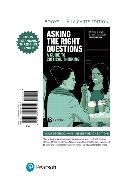Partager
Fr. 24.40
M. Browne, M. Neil Browne, Stuart Keeley, Stuart M. Keeley
Asking the Right Questions: A Guide to Critical Thinking
Anglais · Livre de poche
Expédition généralement dans un délai de 3 à 5 semaines
Description
Table des matières
Table of Contents
- Preface
- The Benefit and Manner of Asking the Right Questions
- The Noisy, Confused World We Live In
- Experts Cannot Rescue Us, Despite What They Say
- The Necessity of Relying on Our Mind
- Critical Thinking to the Rescue
- The Sponge and Panning for Gold: Alternative Thinking Styles
- Weak-Sense and Strong-Sense Critical Thinking
- The Importance of Practice
- Critical Thinking and Other People
- Primary Values of a Critical Thinker
- Keeping the Conversation Going
- Creating a Friendly Environment for Communication
- Writing and Speaking as Critical Thinkers
- What Are the Issue and the Conclusion?
- Kinds of Issues
- Searching for the Issue
- Searching for the Author s or Speaker s Conclusion
- Clues to Discovery: How to Find the Conclusion
- Practice Exercises
- Sample Responses
- What Are the Reasons?
- Initiating the Questioning Process
- Words That Identify Reasons
- Keeping the Reasons and Conclusions Straight
- Reasons First, Then Conclusions
- Writing and Speaking as Critical Thinkers
- Practice Exercises
- Sample Responses
- What Words or Phrases Are Ambiguous?
- The Confusing Flexibility of Words
- Locating Key Terms and Phrases
- Checking for Ambiguity
- Determining Ambiguity
- Context and Ambiguity
- Ambiguity, Definitions, and the Dictionary
- Limits of Your Responsibility to Clarify Ambiguity
- Writing and Speaking as Critical Thinkers
- Practice Exercises
- Sample Responses
- What Are the Value and Descriptive Assumptions?
- General Guide for Identifying Assumptions
- Value Conflicts and Assumptions
- From Values to Value Assumptions
- Typical Value Conflicts
- The Communicator s Background as a Clue to Value Assumptions
- Consequences as Clues to Value Assumptions
- More Hints for Finding Value Assumptions
- The Value of Knowing the Value Priorities of Others
- Values and Relativism
- Identifying and Evaluating Descriptive Assumptions
- Illustrating Descriptive Assumptions
- Common Descriptive Assumptions
- Clues for Locating Assumptions
- Writing and Speaking as Critical Thinkers
- Practice Exercises
- Sample Responses
- Are There Any Fallacies in the Reasoning?
- A Questioning Approach to Finding Reasoning Fallacies
- Evaluating Assumptions as a Starting Point
- Discovering Other Common Reasoning Fallacies
- Looking for Diversions
- Sleight of Hand: Begging the Question
- Summary of Reasoning Errors
- Expanding Your Knowledge of Fallacies
- Practice Exercises
- Sample Responses
- The Worth of Personal Experience, Case Examples, Testimonials, and Statements of Authority as Evidence
- Fact or Opinion?
- The Need for Dependable Evidence
- Sources of Evidence
- Personal Experience as Evidence
- Case Examples as Evidence
- Testimonials as Evidence
- Appeals to Authority as Evidence
- Practice Exercises
- Sample Responses
- How Good Is the Evidence: Personal Observation and Research Studies?
- Personal Observation as Evidence
- Biased Surveys and Questionnaires
- Research Studies as Evidence
- General Problems with Research Findings
- Generalizing From the Research Sampl
A propos de l'auteur
Professor M. Neil Browne has taught critical thinking, great ideas, economics, and law at Bowling Green State University for five decades. During that time, he authored 55 books and 170 professional research articles in multiple disciplines. In addition, he consulted and trained – focusing heavily on critical thinking – the faculty, corporate managers, and government leaders at some of the nation’s most prestigious institutions. He has recently been asked to keynote the International Critical Thinking Conferences in Turkey and China.
Browne created the Honors Scholars Learning Community at Bowling Green, with the single focus of enhancing the critical thinking and ethical reasoning of the university’s most outstanding students. Critical thinking has also been a core element of his success as a coach of Intercollegiate Mock Trial, Intercollegiate Mediation, and Intercollegiate Model Arab League teams.
Stuart Keeley received his Ph.D. in Psychology from the University of Illinois, and enjoyed a flourishing 30-year career as a psychology professor at Bowling Green State University. His undergraduate and graduate teaching focused on abnormal psychology and clinical assessment. He also taught critical thinking to freshmen for many years. In 2000, the Bowling Green State University Trustees awarded him the title of Distinguished Teaching Professor of Psychology.
In addition to Asking the Right Questions: A Guide to Critical Thinking, Keeley has published numerous other books, including Striving for Excellence in College; Asking the Right Questions in Abnormal Psychology; and Psychology on the Internet: Evaluating Online Resources. His dozens of research articles in psychology and higher education have centered around pedagogy, community mental health training, and decision making. Now in his retirement, he continues to be an avid listener and reader, as well as an accomplished author.
Détails du produit
| Auteurs | M. Browne, M. Neil Browne, Stuart Keeley, Stuart M. Keeley |
| Edition | Pearson |
| Langues | Anglais |
| Format d'édition | Livre de poche |
| Sortie | 28.05.2024 |
| EAN | 9780134425610 |
| ISBN | 978-0-13-442561-0 |
| Pages | 192 |
| Dimensions | 147 mm x 229 mm x 13 mm |
| Poids | 272 g |
| Catégories |
Littérature spécialisée
> Politique, société, économie
> Autres
Sciences humaines, art, musique > Sciences humaines en général |
Commentaires des clients
Aucune analyse n'a été rédigée sur cet article pour le moment. Sois le premier à donner ton avis et aide les autres utilisateurs à prendre leur décision d'achat.
Écris un commentaire
Super ou nul ? Donne ton propre avis.

